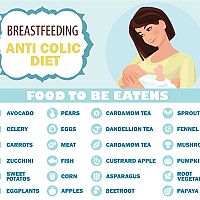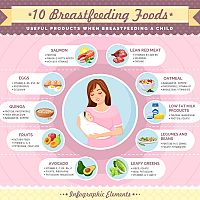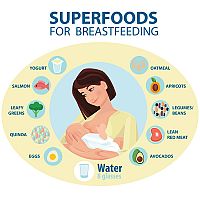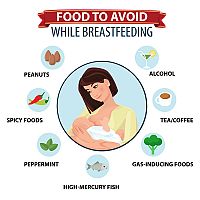
What not to eat while breastfeeding - are poppy seeds, ginger or chocolate suitable while breastfeeding?
The menu during breastfeeding has its own certain rules, which mothers are definitely not advised to bypass. After all, it is about the health of the mother and the baby. Diet during breastfeeding has many restrictions. During this period, there are certain forbidden foods that mothers must avoid. The reason is that these substances also get into breast milk, the quality of which can subsequently be compromised. The child may even reject breast milk completely or it may cause digestive problems. A balanced diet rich in vitamins, minerals and necessary nutrients is important, but some eating habits will need to be adjusted for a while. What should not be eaten while breastfeeding?
- A healthy diet while breastfeeding is important
- Do not underestimate the drinking regime during breastfeeding
- What not to eat while breastfeeding
- Milk and milk products
- Meat and fish as a source of protein during breastfeeding
- Carbohydrates and fiber during breastfeeding
- Fruits and vegetables during breastfeeding
- Nuts and peanuts
- Chocolate while breastfeeding
- Poppy while breastfeeding
- Herbs during breastfeeding
- Caffeine - coffee during breastfeeding
- Smoking and medication during breastfeeding
- Experiences
- The most frequent questions - FAQ
- Comments
After giving birth, many mothers, among other joys, look forward to finally enjoying foods that they could not indulge in during pregnancy. However, the breastfeeding phase does not always allow them to do this, and again it is necessary to pay attention to what not to eat during breastfeeding. The diet while breastfeeding a newborn has its limitations, and keep in mind that you will have to eliminate certain foods from your diet plan for a certain period of time. Breastfeeding represents a period in which the mother should avoid certain foods. It is also necessary to observe a copious drinking regime. What about fruits and vegetables while breastfeeding? Is there a specific list of foods for breastfeeding mothers to avoid?
A healthy diet while breastfeeding is important
After giving birth, the mother must realize that another boarder has been added to the family, which requires extra care. Breastfeeding and diet are closely related. It is important for the mother to monitor what she eats and drinks, what she can and cannot do. A varied, balanced and appropriate diet is important mainly because many tastes, smells and ingredients are transferred to the breast milk, which is consumed by the child itself. It is necessary to supplement vitamins and minerals. A high-quality and hearty diet also has an impact on the production of breast milk. There are foods that support lactation, but at the same time, there are also prohibited foods that can stop lactation.
Your eating habits therefore have a direct impact on the quality of breast milk. A balanced diet should contain a sufficient amount of carbohydrates and fiber (cereals, pasta, rice, bread), proteins (poultry, meat, heat-treated eggs or fish), dairy products, fruits and vegetables. With the fact that certain restrictions apply here as well, which you will read about below. It is possible to have a varied menu even with certain restrictions. However, know that radical restrictions in the diet are not a necessity, some forbidden foods are more of a prevention. Stop eating food completely only when you suspect that it is making you or your baby sick.
It should be borne in mind that the smaller the baby is, the more sensitive it may be to certain food components. Every baby is different, the fact that eating peanuts can cause an allergy in one does not mean that it will in another. As the weeks go by (from the 2nd to the 3rd month), you can gradually try to add foods that you like to the menu, but always monitor the baby's reactions and write down any complications in the diary. That way you will have an overview of the fact that it does not suit the child. On the contrary, what harms you will also harm the baby. Also, don't forcefully eat anything just because someone told you to or you read it. Don't let restrictions discourage you and stick to the motto "I breastfeed, that's why I eat". So what not to eat when I'm breastfeeding?
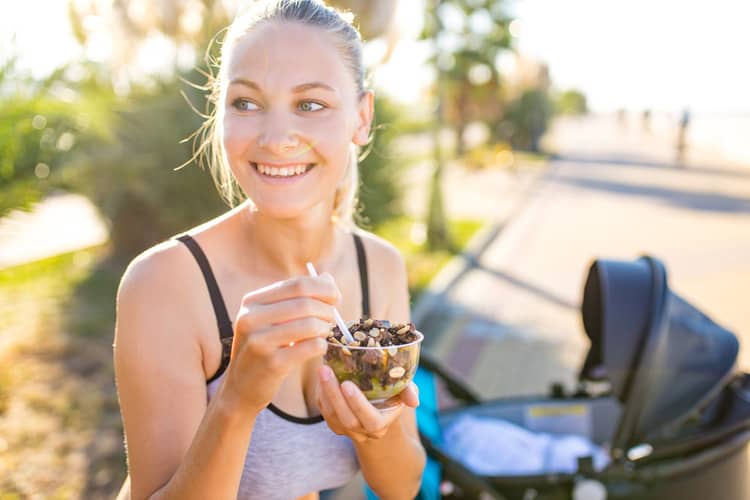
Do not underestimate the drinking regime during breastfeeding
Breastfeeding women are recommended to drink at least 2.5-3 liters of fluids. Drinking regime is at least as important as eating habits. Many mothers believe that increasing fluid intake will promote lactation and increase milk production. It is true that with a lack of fluids, lactation may be slower, but increased fluid intake does not have a direct effect on the production of the amount of milk, as the excess fluid is eliminated by the body in the urine.
It is advisable to drink still mineral water, tap water, 100% fruit juices without preservatives and dyes, milk (watch the possible reactions of the baby) or fruit and herbal teas without increased caffeine content. Honey tea is very suitable during breastfeeding, teas made from alchemy, fennel or chamomile are also suitable. However, pay attention to the aforementioned caffeine content in black and green teas. Be careful also with sweetened drinks, such as Coca cola or Kofola. Absolutely avoid alcohol, which is not suitable during breastfeeding. For example, non-alcoholic beer does not harm, and coffee (in moderation) is not an absolute evil either.
What not to eat while breastfeeding
What should a nursing mother not eat? It is important to say that several foods, the negative effects of which are discussed during breastfeeding, may not be confirmed in the case of you and your baby. In general, these recommendations are valid primarily for the first weeks and months of breastfeeding, when the child is sensitive to several substances and food components. If you find that the child is sensitive to a given food, write it down in the diary. If we were to create a list of types of food for breastfeeding mothers who cannot eat, we would include these food groups.
- Aromatic foods, spicy or sour foods. When eating foods while breastfeeding, avoid strong spices (curry, cinnamon, thyme, rosemary, chili).
- Vegetables, especially those that cause bloating - kohlrabi, kale, cabbage, cauliflower, broccoli, but also aromatic vegetables, such as onions, garlic or horseradish. Celery, tomatoes or peppers can cause allergic reactions.
- Inflating fruits - apricots, peaches, pears, grapes. Also, in the beginning, avoid overly acidic fruits and fruits that are a potential strong allergen - strawberries, oranges, lemons, tangerines or pomelo.
- Legumes cause bloating, try to limit their intake - peas, lentils, beans, chickpeas. Be careful also with soy, which can be an allergen.
- Zero alcohol tolerance? Alcohol changes the taste of breast milk. Although some would say that a glass of wine while breastfeeding does not hurt, wine is definitely not a must. If you want to treat yourself to 2 dcl of wine, do not start breastfeeding earlier than in 2 to 3 hours. At the same time, increase the intake of non-alcoholic liquids.
- No energy drinks.
- Nuts belong to the group of strong allergens and most doctors do not recommend their consumption while you are breastfeeding – peanuts, hazelnuts, Brazil nuts or almonds.
- Chocolate during breastfeeding can also be a strong allergen, similar to sweets sold in stores, which often contain emulsifiers, preservatives or dyes.
- Uncooked meat products or raw fish.
- Unpasteurized dairy products. Be careful also with possible allergies - intolerances to cow, sheep, goat or vegetable soy milk.
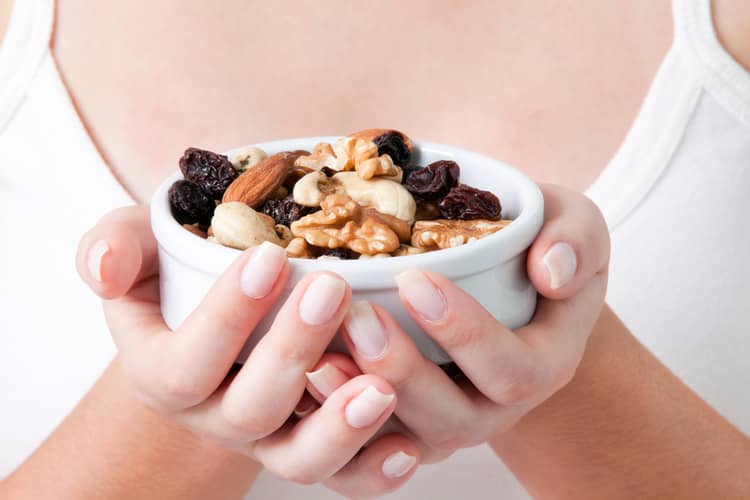
Milk and milk products
Low-fat dairy products with a lower fat content are best. They are a perfect source of protein and calcium. You can include sour milk products (kefir, cottage cheese), white yogurts or unsalted and unsmoked cheeses in your meal plan. It is better to leave mayonnaise and tartar sauce out of your diet, which are a source of a lot of unhealthy fats, but also full of emulsifiers, preservatives and dyes.
For example , bryndza is suitable during breastfeeding, the problem is only if it is not pasteurized. It may contain infectious listeria. Such dairy products, i.e. bryndza, which have not undergone heat treatment, are always to some extent a risk and are not recommended for pregnant or lactating women to consume. At the same time, you can almost always buy pasteurized bryndza in stores. Still, you should avoid fatty cheeses and high-fat dairy products. Therefore, it is better to bet on low-fat products with a lower content of animal fat.
Meat and fish as a source of protein during breastfeeding
Meat is an excellent source of protein and iron, which also has a high energy value. Lean white meat, such as chicken or turkey, is ideal. Meat from rabbit or red meat (a great source of iron) from muscle - lamb, beef or pork is also suitable. Meat broths, or meat and vegetable soups.
Eggs are also a suitable source of protein during breastfeeding, but be careful, as they can sometimes cause bloating. Last but not least, there are fish, which are not only a source of protein, but also of iodine. Fish such as salmon, cod or trout are ideal. It is better not to include canned fish in your diet. From the point of view of fish, avoid seafood and especially raw fish during breastfeeding. The same applies to tartare or other uncooked meat dishes.

Carbohydrates and fiber during breastfeeding
In this case, the best source of fiber is cereals. Definitely don't forget bread, ideally from whole grain flour, but traditional wheat bread is not a problem either. In the case of fresh baked goods, watch out for swelling (yeast). Great sources of carbohydrates include pasta, rice or potatoes. If you don't mind oatmeal, couscous or bulgur, you can also enrich your diet with these foods during breastfeeding.
Fruits and vegetables during breastfeeding
They are the main source of vitamins and minerals. However, be very careful with some types of fruit and vegetables. Especially in the early days of breastfeeding, when the child is very sensitive to some components, and it is fruits and vegetables that can cause a strong allergic reaction. Suitable fruits include bananas, apples, blueberries or plums. Be careful with pineapple and strawberries, which can be a strong allergen.
In the case of vegetables , avoid those that puff up, especially leafy vegetables and those that are too aromatic. Among the leafy vegetables, spinach, for example, is suitable during breastfeeding. Tomatoes, peppers, garlic or onions are problematic, and radishes, for example, are also bloated. Carrots, eggplants, pumpkins, beets, potatoes or zucchini are very suitable for breastfeeding. However, always monitor reactions to see if certain types of fruit or vegetables cause problems for the baby.

Nuts and peanuts
Nuts are often discussed foods. It is well known about them that they are strong allergens. Therefore, you need to be very careful when breastfeeding with them, and some doctors recommend that mothers completely remove them from their diet during breastfeeding. Almonds, pistachios, walnuts, hazelnuts, Brazil nuts or peanuts. They are a great source of healthy fats and omega-3 fatty acids. Until recently, doctors did not recommend children to consume such peanuts until the age of 3. However, modern research has pointed to the fact that if a mother consumes peanuts while breastfeeding and a child under the age of 1 comes into contact with their composition, the probability of developing an allergy is up to five times lower.
Chocolate while breastfeeding
The sweet tooth is omnipotent and breastfeeding mothers know it very well. We reassure you, despite the fact that chocolate is also considered a potential allergen, the occasional consumption of chocolate should not cause a problem. Chocolate does not significantly affect the quality of breast milk. It is ideal to treat yourself to a few pieces of dark chocolate, but if you sin here and there with a chocolate biscuit, nothing will happen. But everything in moderation and, if at all, try to avoid various "commercial" sweets, replace them with a banana or an apple.
Poppy while breastfeeding
Most doctors do not recommend poppy during breastfeeding, even in the later weeks. The reason is that, especially at an early age, it can cause allergic reactions or colic (abdominal pain). Although it is a great source of calcium, try to avoid poppy seeds at least during the first few months of breastfeeding. You can gradually include it in your diet. After enjoying the poppy seed cake, watch the baby's reaction. Each child may react differently to poppy seeds and may not cause an allergic reaction at all.
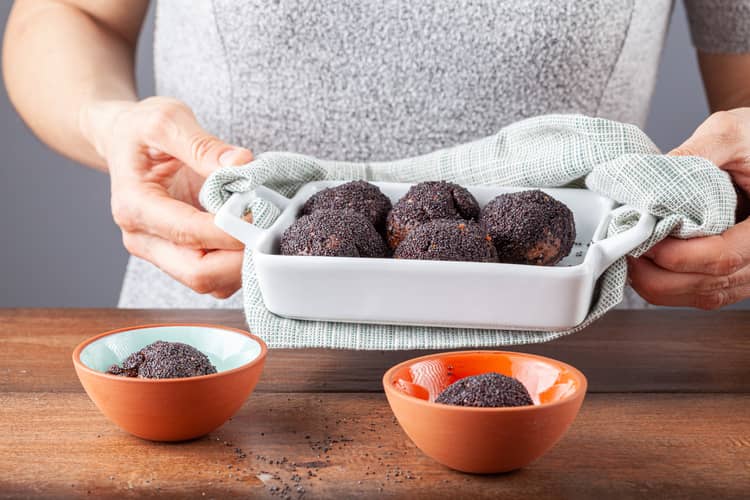
Herbs during breastfeeding
Herbal teas are a great way to enrich your drinking regime when breastfeeding. At the same time, many herbs are a great alternative to classic drinking water or still mineral water for nursing mothers. In addition, herbal teas during breastfeeding help with digestion, soothe or support lactation. Honeysuckle has a very calming effect, while alchemy can have a positive effect on lactation support. Fennel helps with digestion, but its strong aromaticity can be a hindrance. Chamomile tea is also a very good choice, which also helps with digestion. Herbal tea mixtures that contain a higher proportion of green or black tea should be avoided. They contain theine, which is the name for caffeine found in teas. There is no need to overdo it with a lot of tea either.
Ginger and breastfeeding
In this case, there is a group of mothers and doctors who say that during breastfeeding ginger does not affect the quality of breast milk or the mother's body in any negative way. The second group does not recommend ginger during breastfeeding. According to them, the strong pungent taste of ginger can have a similar effect to chili. On the other hand, in a small amount, in the case of ginger tea or grated ginger, its effects should certainly not be harmful. The best thing to do is to consult your attending physician.
Caffeine - coffee during breastfeeding
For many mothers, coffee is something they looked forward to the most after pregnancy. Is coffee even suitable during breastfeeding? Coffee while breastfeeding is the subject of many discussions, but the conclusion is often similar. Mothers can consume coffee while breastfeeding, but to a limited extent. The concentration of caffeine in coffee is difficult to estimate due to the different types of coffee.
The purpose of caffeine is to supply the body with energy for a short period of time and to stimulate the organism. Caffeine also passes through breast milk in small amounts into the baby's body. Keep in mind that if you drink tea, a small amount of caffeine is also found in them. Therefore, it is not recommended to drink more than 1 coffee a day. Excessive intake of caffeine can cause poor sleep or restlessness. In children, for example, crying and hyperactivity.

Smoking and medication during breastfeeding
In this case, it is necessary to draw a red line, because smoking during breastfeeding is strictly prohibited by doctors. Nicotine itself affects the process of milk production and also affects its quality and taste. Smoking during breastfeeding is also responsible for frequent digestive problems.
Always consult a doctor about the use of medicines during pregnancy. In most cases, it is not a problem if you take, for example, Ibalgin, Novalgin, Paralen, Theraflu or Flector for headaches, stomachaches or colds. These drugs do not affect the quality of breast milk in any way. However, this does not apply to antihistamines and cough medicines (Zodac, Stoptussin, Mucosolvan).
Experiences
Fresh bread, legumes, cabbage and nuts are just some of the foods that breastfeeding women should avoid. Mothers said that cabbage is only suitable in its raw state, sour cabbage could cause problems, citrus fruits are not recommended and fruits in general should also be consumed carefully, especially strawberries should be avoided. Astringent or sparkling water is not very suitable either.
The most frequent questions - FAQ
Do you already know what not to eat while breastfeeding? Are pickles suitable during breastfeeding? How kohlrabi, strawberries or coffee while breastfeeding? You will find answers to these questions in our article. At the same time, we will be grateful to the readers - mothers, if they share their own experiences with diet during breastfeeding in the discussion under the article. What did you avoid while breastfeeding? On the other hand, what did you like and agree with?
What can be caused by an inappropriate diet during breastfeeding?
How to eat while breastfeeding?
Can I drink cow's milk while breastfeeding?
What should be the drinking regime during breastfeeding?
Are pickles suitable during breastfeeding?
Can I eat cod in mayonnaise while breastfeeding?
Gallery
Pridať komentár

